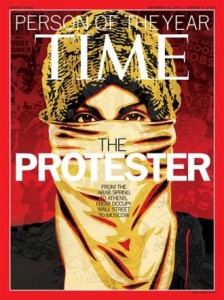“Any man today can lay claim to being filmed”
–Walter Benjamin, The work of Art in the Age of Mechanical Reproduction
 Time Magazine recently named “The Protester” its 2011 “Person of the Year.” In a year defined by an Arab Spring where the people of Africa and the Middle East risked life and limb to demand democracy, and Americans “Occupied Wall Street” to reclaim democracy, Time’s choice made perfect sense.
Time Magazine recently named “The Protester” its 2011 “Person of the Year.” In a year defined by an Arab Spring where the people of Africa and the Middle East risked life and limb to demand democracy, and Americans “Occupied Wall Street” to reclaim democracy, Time’s choice made perfect sense.
But I submit that a strong runner up for “Person of the Year” should be “Social Media”—that is, “Facebook,” “Twitter,” and handheld devices (PDA’s, etc). No, these social media tools aren’t actual people, but they provided the tools for the protesters to organize and reveal to the world their plight.
 When studying for my doctorate, I immersed myself in the Frankfurt School of philosophy . Many of its leading thinkers were weary of the rise of technology as a tool for totalitarians. Theodor Adorno even warned of a “culture industry” wherein consumerism masks itself as choice, instilling a false sense of personal freedom when there was no real freedom.
When studying for my doctorate, I immersed myself in the Frankfurt School of philosophy . Many of its leading thinkers were weary of the rise of technology as a tool for totalitarians. Theodor Adorno even warned of a “culture industry” wherein consumerism masks itself as choice, instilling a false sense of personal freedom when there was no real freedom.
A dissenting view within the Frankfort School came from Walter Benjamin, who believed new technologies (in the context of his writing, the increased use of film and photography) could have a political effect that could be liberating if placed in the hands of the people. Benjamin, a Jew fleeing from the Nazis, committed suicide when it appeared he was going to be captured and sent to concentration camps. At a time when Hitler was in power and using film for purposes of mass propaganda, Benjamin’s technological optimism, in context, seems surprising.
But Benjamin’s views now seem especially prescient in a year when Twitter was literally used to organize protests in Tunisia and Egypt. In countries like Iran, where two-third of the citizens are under 35, handheld cell phone cameras and videos communicated to the world a clamoring for liberty from Iranian youth rebelling again oppressive theocracy.
 Social media technologies in 2011 became tools of dissent. The question now becomes, can totalitarian regimes withstand technologies literally in the hands of everyday people now equipped to give witness to abuse of power and the struggle for freedom. The whole world is watching at a historic level. The Protester now has new tools of dissent that are nearly impossible to quash, and that is a beautiful thing.
Social media technologies in 2011 became tools of dissent. The question now becomes, can totalitarian regimes withstand technologies literally in the hands of everyday people now equipped to give witness to abuse of power and the struggle for freedom. The whole world is watching at a historic level. The Protester now has new tools of dissent that are nearly impossible to quash, and that is a beautiful thing.









Leave a Reply